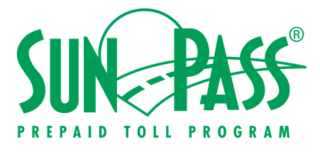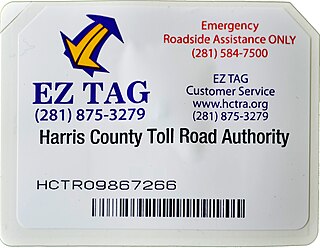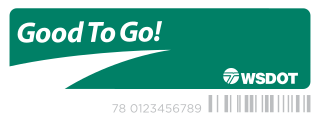Related Research Articles

A toll road, also known as a turnpike or tollway or toll gate, is a public or private road for which a fee is assessed for passage. It is a form of road pricing typically implemented to help recoup the costs of road construction and maintenance.

A toll bridge is a bridge where a monetary charge is required to pass over. Generally the private or public owner, builder and maintainer of the bridge uses the toll to recoup their investment, in much the same way as a toll road.

Electronic toll collection (ETC) is a wireless system to automatically collect the usage fee or toll charged to vehicles using toll roads, HOV lanes, toll bridges, and toll tunnels. It is a faster alternative which is replacing toll booths, where vehicles must stop and the driver manually pays the toll with cash or a card. In most systems, vehicles using the system are equipped with an automated radio transponder device. When the vehicle passes a roadside toll reader device, a radio signal from the reader triggers the transponder, which transmits back an identifying number which registers the vehicle's use of the road, and an electronic payment system charges the user the toll.
E-ZPass is an electronic toll collection system used on toll roads, toll bridges, and toll tunnels in the Eastern United States, Midwestern United States, and Southern United States. The E-ZPass Interagency Group (IAG) consists of member agencies in several states, which use the same technology and allow travelers to use the same transponder on toll roads throughout the network.

FasTrak is the electronic toll collection (ETC) system used in the state of California in the United States. The system is used statewide on all of the toll roads, toll bridges, and high-occupancy toll lanes along the California Freeway and Expressway System.

SunPass is an electronic toll collection system within the state of Florida, United States. It was created in 1999 by the Florida Department of Transportation's (FDOT's) Office of Toll Operations, operating now as a division of Florida's Turnpike Enterprise (FTE). The system utilizes windshield-mounted RFID transponders manufactured by TransCore and lane equipment designed by companies including TransCore, SAIC, and Raytheon.
Smart Tag is the former name of a transponder-based electronic toll collection system implemented by the Virginia Department of Transportation (VDOT). It was launched as Fastoll on April 15, 1996. Fastoll was rebranded as Smart Tag in 1998, and was placed under the umbrella of Smart Travel. In November 2007, the Smart Tag brand name was retired in favor of E-ZPass Virginia, several years after the Smart Tag system became a part of the E-ZPass network.

EZ TAG is an electronic toll collection system in Houston, Texas, United States, that allows motorists to pay tolls without stopping at toll booths. Motorists with the tags are allowed to use lanes reserved exclusively for them on all Harris County Toll Road Authority (HCTRA) roads. As of late 2003, the EZ TAG can also be used on all lanes of tolled roadways in Texas that accommodate electronic toll collection.

I-Pass is the electronic toll collection system utilized by the Illinois State Toll Highway Authority (ISTHA) on its toll highways that launched on November 18, 1993, with the opening of Interstate 355. It uses the same transponder as the E-ZPass system used in the Northeastern US, the Chicago Skyway, and the Indiana Toll Road, along with the Indiana State Road 912 Indiana Harbor and Ship Canal bridge.
E-ZPass Minnesota, formerly MnPass, is the brand name associated with a series of high occupancy toll lanes and electronic toll collection (ETC) system in the Minneapolis-St. Paul Metropolitan Area of Minnesota. The lanes and the ETC system are owned by the Minnesota Department of Transportation (MnDOT) and fully compatible with the multi-state E-ZPass network.

TxTag, operated by the Texas Department of Transportation (TxDOT), is one of three interoperable electronic toll collection systems in Texas. The system is also interoperable with the K-TAG system used in Kansas and the Pikepass system used in Oklahoma.

Good to Go, stylized as GoodToGo!, is the electronic toll collection program managed by the Washington State Department of Transportation on all current toll and future projects in the U.S. state of Washington. Regular Good to Go customers may set up an account from which tolls are automically deducted. Vehicles that are not linked to an account are photographed and a toll bill is sent to the registered owner by U.S. mail.

Video tolling is a form of electronic toll collection that uses video or still images of a vehicle's license plate to identify a vehicle liable to pay a road toll. The system dispenses with collection of road tolls using road-side cash or payment card methods, and may be used in conjunction with "all electronic" open road tolling, to permit drivers without an RFID device to use the toll road.
The North Carolina Turnpike Authority was created in 2002 to speed the implementation of needed transportation improvements by funding some projects with tolls. Governed by a nine-member authority board, it is located within the Department of Transportation and under the direct supervision of the Secretary of Transportation. The authority has the power to study, plan, develop and undertake preliminary design work on up to eleven turnpike projects. At the conclusion of these actives, the authority is authorized to design, establish, purchase, construct, operate and maintain toll highways and bridges. The authority is also authorized to designate one or more lanes of any highway, or portion thereof, into a high-occupancy toll lanes or other type of managed lanes; provided that such designation does not reduce the number of existing non-toll general purpose lanes.

e-TAG is a free-flow tolling electronic toll collection system used on all tollways throughout Australia. It was originally developed by Transurban for use on their CityLink tollway in the late 1990s, with the system since adopted by all toll roads, bridges and tunnels in Australia. The technology had different names depending on the issuer, such as Breeze, Linkt, and E-toll. However, these are all interchangeable across Australia and no surcharges apply for use on other operators' toll roads.
eToll is a National Roads Authority run interoperability system allowing cashless payment on all of Ireland's toll roads. Based on an RFID tag attached to the windscreen of a participating vehicle, it allows drivers to travel on the tolled sections of them M1, M4, M6, M7, M8 and M50 as well as the East Link, N25 Waterford bypass, Dublin Port Tunnel, and the Limerick (Shannon) Tunnel.
A vehicle miles traveled tax, also frequently referred to as a VMT tax, VMT fee, mileage-based fee, or road user charge, is a policy of charging motorists based on how many miles they have traveled.
On roadways around the United States, radio-frequency identification (RFID) transponders, supporting transceivers, antennas, and video cameras are the current standard for the collection of toll fees. This technology was invented during the 1970s and was implemented throughout the 1980s and 1990s. Today, the fastest growing payment technologies center around smart phones. These devices are beginning to permit tolling authorities new channels of toll collection and communication with drivers. There are a number of mobile applications that are available for drivers to use as a way to manage their toll accounts as well as applications that actually allow the consumer to pay tolls from their smart phone.
Peach Pass is an electronic toll collection system in use in the U.S. state of Georgia, which is currently used primarily for high-occupancy toll lanes and express toll lanes on Interstate 75 (I-75), I-85, and I-575 in metropolitan Atlanta. Peach Pass can also be used on toll roads in Florida and North Carolina where SunPass and NC Quick Pass are permitted, and vice versa; Peach Pass will soon become compatible with E-ZPass, which is now interoperable with the latter two systems.
References
- ↑ "RFID Solutions for Tolling".
- ↑ "NationalPass is a toll interoperability solution with seamless access to U.S. roadways without managing multiple transponders or toll accounts".
- 1 2 "TransCore launches service to offer toll interoperability across the USA". Traffic Technology Today . May 23, 2016.
- ↑ "NationalPass Service and Universal Toll Module" (PDF). International Bridge, Tunnel and Turnpike Association. 2016. Retrieved August 28, 2019.
- ↑ Higgs, Larry (May 16, 2016). "New tag allows drivers to pay tolls in 19 states". Newark Star-Ledger .